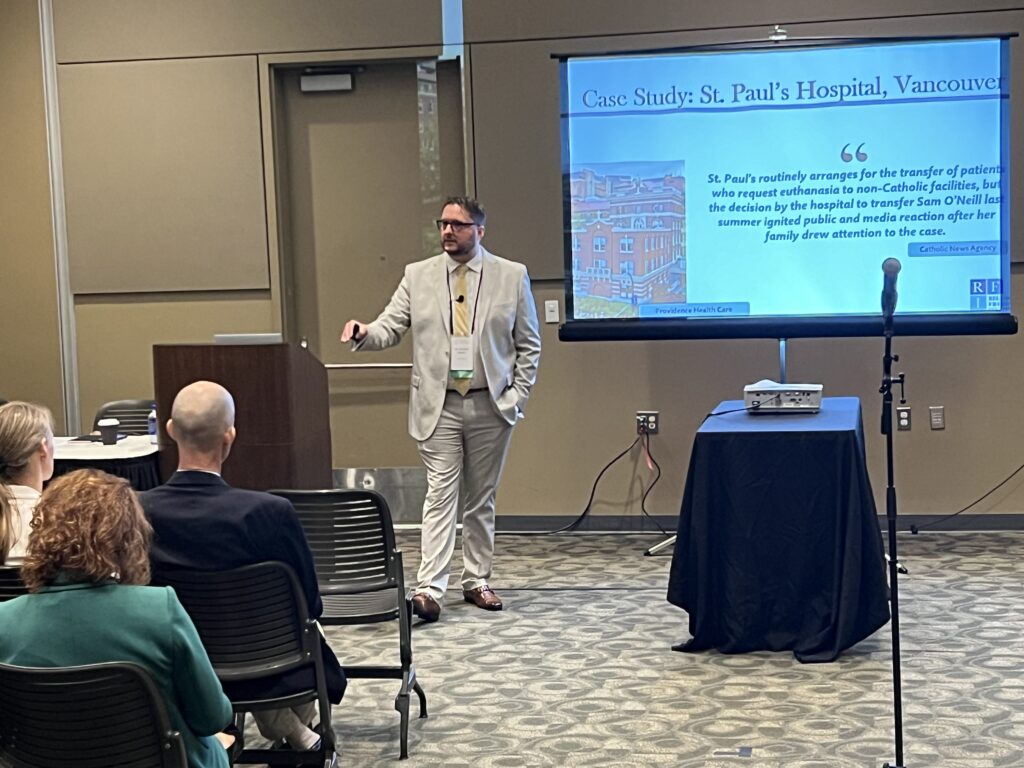
Protecting medical conscience rights remains a flashpoint in the United States and Canada. Andrew Kubick, RFI Research Fellow in Bioethics and Medical Conscience, addressed this topic in a wide-ranging presentation to healthcare professionals, pastors, teachers, and others this week at the Acton Institute’s annual Acton University held in Grand Rapids, Michigan.
Today’s healthcare controversies are often rooted in our society’s rising tendency to prioritize claims of individual autonomy and identity over other considerations. And yet, the field of medicine necessarily invites serious reflection on foundational matters of human nature, morality, and reality that in other fields can be more easily suppressed (at least for a time).
For religious practitioners and institutions, Kubick noted, the stakes are extraordinarily high. Their moral principles — whether on abortion, contraception, “gender transition,” euthanasia, physician assisted suicide, etc. — are informed by their religious convictions about God, his commands, and the created order. Legal protections for medical conscience rights are intended to safeguard faithful medical professionals and institutions to ensure they are not forced to choose between their religiously informed conscience and their calling in medicine.
Kubick pointed to two contemporary cases to put his presentation “on the ground.” One case in the state of Michigan involves a physician assistant, Valerie Kloosterman, who was fired after 17 years of providing excellent patient care due to her refusal to use pronouns that conflicted with patients’ biology, and her unwillingness to make referrals for “gender-transition” drugs or procedures. The other case involved a public outcry criticizing and challenging St. Paul’s Hospital in Vancouver, British Columbia for its refusal to allow euthanasia and physician assisted suicide on its premises.
The underlying issues in these cases are weighty and the legal questions demanding. Nevertheless, the robust vision of medical conscience rights Kubick outlined provides a moral and legal framework for securing religious freedom in healthcare, even in highly pluralistic societies like the United States and Canada.
THE RFI BLOG

Does Southeast Asia Lead the World in Human Flourishing?

RFI Leads Training Session on Religious Freedom Law and Policy for U.S. Army War College

Oral Argument in Charter School Case Highlights Unconstitutional Motives Behind OK Attorney General’s Establishment Clause Claim

Largest Longitudinal Study of Human Flourishing Ever Shows Religion’s Importance

Keys To Human Flourishing: Faith And Relationships Outweigh Wealth
CORNERSTONE FORUM

Reaffirming Religious Freedom: Bridging U.S. Advocacy and Iraq’s Constitutional Framework

Political Polarization, Same-Sex Marriage and Religious Liberty

Bridging the Gap Between International Efforts and Local Realities: Advancing Religious Freedom in the MENA Region

Challenges to Religious Freedom in Iraq and the Critical Need for Action

